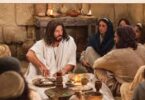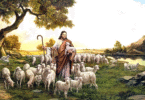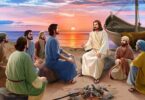7th Sunday of the Ordinary Time (Year C)
Scripture: 1 Sam. 26:2, 7-9, 12-13, 22-23; Ps. 103: 1-2, 3-4, 10, 12-13; 1 Cor. 15:45-49; Lk. 6:27-38
A monk went into isolation to meditate on the truths of life. His followers also went in search of him. While they were at meditation, someone would steal their personal things. They informed the monk but he was not willing to take action. This happened repeatedly until they found the culprit. They brought him before the monk and demanded that he should take action against him and should expel him from the congregation. The monk refused to take action which annoyed his followers. The monk replied, “You are wise people. You know what is right and wrong but this brother does not know what is right and wrong. My job is to teach him that. If I do not teach him then who will teach him? I cannot expel him even though all of you decide to walk out of the monastery.” When the thief heard it, he burst into tears. He changed his life and amended his ways. The monk proved that God’s mercy prevailed over revenge or punishment. The story has a profound message for all of us. God’s Mercy is the force that reawakens us to new life and instils in us the courage to look to the future with hope, says Pope Francis.
The liturgy of the word also highlights this message of mercy. In the first reading, King David shows mercy to King Saul who had been seeking to kill him. The reason behind it was Saul felt threatened with the rise of David. He had killed Goliath. The Jewish women sang glories to David by saying, “Saul has struck down his thousands and David had ten thousand. All the people of Israel and Judah loved David. From that time, Saul kept a jealous eye on David (Sam 18:9). He sought to kill him. As a result, David had to run away for his life.
In such a situation, David showed mercy to Saul on two different occasions. Both the occasions are quite similar. The first happened when Saul had entered into the cave to take some rest, David was hiding in the same cave. David sneaked in behind him and cut off the end of his mantle. Later, David conveyed to him that he had spared his life (1 Sam 23:14- 24:22). The second incident is recorded in the first reading. Saul had continued his chase of David into the desert of Ziph. Saul was resting in the night when David and Abishai quietly entered the cave. David took the king’s spear and water jug and went away. From a distance, David once again reminded Saul and his companion that he had spared their lives. David’s act of mercy shows us the reason why God liked him. Although King Saul did not change his ways, he could not stop David from becoming the King of united Israel.
Psalm 103 is called the Psalm of David. He invites us to bless the Lord because of all the good things He has done for us. One of the first things is pardoning our sins. There are so many other things but above all David blesses God for his mercy and compassion. He is slow in anger and rich in mercy. He throws our sins far away. The psalm echoes the theme of today’s first reading, therefore, the church picks up the core of the message and turns it into our response: The Lord is kind and merciful.
In the Gospel, the same message has been highlighted. The Gospel text continues from where it had ended last Sunday. Jesus teaches his disciples the challenges to be disciples such as love your enemies, turn the other cheek, give to those who ask, do good unto others, lend without expecting repayment, judge not lest you be judged, etc. What is striking in the Gospel of Luke is that he concludes Jesus’ teaching by emphasizing the mercy of God. It is all the more important to notice the novelty of Jesus’ teaching. The Jews were grown with the thought of an eye for an eye and a tooth for a tooth. This was a Babylonian code of Hammurabi. Jesus gave us a new rule; love one another as I have loved you. He invites us to do good to others. Every disciple must truly love his neighbour. This will pave the way for his place in heaven. In other words, Jesus is inviting us to imitate him so that we will be with him forever. Jesus has shown the way. He has revealed the truth i.e. Mercy brings healing and reconciliation in our relationship. It brings harmony. It brings us together. In this intolerant world, we are called to be merciful just as our Father is merciful.
A monk in the monastery showed mercy to the thief. King David showed mercy to King Saul. Their acts of mercy had the force of reawakening new life. Jesus has taught us the importance of mercy in our lives. He has not only taught us but also given us a witness on the cross when he prayed for all of us: Father, forgive them they know not what they do (Lk. 23-34). Mercy is the force that reawakens us to new life and instils in us the courage to look to the future with hope. If this is true, are we ready to show mercy to our brothers and sisters? Are ready to become the messengers of mercy? Let us pray during this Eucharist for the same.






